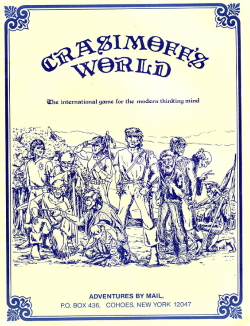Related Research Articles

A play-by-mail game is a game played through postal mail, email, or other digital media. Correspondence chess and Go were among the first PBM games. Diplomacy has been played by mail since 1963, introducing a multi-player aspect to PBM games. Flying Buffalo Inc. pioneered the first commercially available PBM game in 1970. A small number of PBM companies followed in the 1970s, with an explosion of hundreds of startup PBM companies in the 1980s at the peak of PBM gaming popularity, many of them small hobby companies—more than 90 percent of which eventually folded. A number of independent PBM magazines also started in the 1980s, including The Nuts & Bolts of PBM, Gaming Universal, Paper Mayhem and Flagship. These magazines eventually went out of print, replaced in the 21st century by the online PBM journal Suspense and Decision.
Starweb is a closed-end, space-based, play-by-mail (PBM) game. First published by Flying Buffalo Inc. in 1975, it was the company's second PBM game after Nuclear Destruction, the game that started the PBM industry in 1970. Players today can choose a postal mail or email format. Fifteen players per game assume one of six available roles and explore and conquer planets within a universe comprising 225 worlds. The object of the game is to attain a predetermined number of points which are generated by various actions during gameplay. Multiple game variants are available. Starweb is still available for play as of 2021 through the company Rick Loomis PBM Games.
Starmaster is a open-ended, computer-moderated play-by-mail game that was published and administered by Schubel & Son.

Empyrean Challenge is a strategic science fiction play-by-mail (PBM) game. Published by Superior Simulations in 1978, its introduction was important to the nascent PBM industry. 150 players per game strove to dominate a cluster of star systems. Diplomacy, combat, economics, technological development, colonization, and other factors were important aspects of gameplay. Detailed work was required in all aspects of the game, requiring a significant investment in time for players. Reviewer Jim Townsend stated in 1988 that Empyrean Challenge was "the most complex game system on Earth".
Pellic Quest was a computer-moderated science fiction play-by-mail (PBM) game appearing as early as 1978. Conflict Interaction Associates published it as a spinoff of Flying Buffalo's game Starweb. In the game, 10–15 players competed to dominate a universe strewn with artifacts left by a super-race, the Pellics. Players role-played one of six character types with options to develop their position, expand through conquest, conduct diplomacy, and other actions. The game received generally positive reviews in gaming magazines in the late 1970s and early 1980s. The publisher appeared to close the game by 1988.

Heroic Fantasy is a computer-moderated, dungeon crawl play-by-mail game. It has been active since 1982 when it was published by Flying Buffalo. The initial edition involved nine dungeon levels. Flying Buffalo published subsequent editions due to challenging gameplay initially, eventually limiting the game to four dungeon levels with a fifth outdoors level where players can assemble an army and capture one or more castles. The game is open-ended; gameplay continues until players decide to stop.
Catacombs of Chaos is a play-by-mail game that was published by Schubel & Son.
Star Venture is a play-by-mail game begun by Schubel & Son in 1982. The game was open-ended and computer moderated.
Star Trek: The Correspondence Game is a play-by-mail game that was published by Entertainment Concepts, Inc.
Midgard is an open-end, medieval fantasy play-by-mail game. It was published in 1984 by Time Space Simulations. Through 1996, the game passed through more than four different publishers, including Midgard USA. As of 2022, Talisman Games is the publisher. At initial publication, Midgard was computer moderated with partial human moderation.

Crasimoff's World is a play-by-mail (PBM) game that was first developed by Kevin Cropper in 1980. It is regarded as the first fantasy role-playing PBM game.

Warboid World is a play-by-mail game originally published and moderated by Adventures by Mail in 1983 in which players build up armies of robots and send them to destroy other players' robot factories.
Lords of the Earth (LOTE) is a play-by-email game, first published by Thomas Harlan in 1983 during a growing era of PBM games. Initially played by postal mail, the game featured mixed moderation—computer moderated with some human assistance. By 2002, the publisher processed turns by email (PBeM). Lords of the Earth comprises multiple campaigns, each one a separate game. Campaign 1 is the oldest, set in the mid-1800s in the "Age of Air and Steam". Other campaigns begin from 2000 BCE to 1400 CE. Settings were global in scale, with one campaign featuring an outer space setting.
Schubel & Son was a hobby and gaming company that published play-by-mail (PBM) games. The company began in 1974 and expanded to large-scale PBM games in August 1978. It also published the game The Tribes of Crane in 1978, followed by StarMaster in 1980 and Global Supremacy in 1982.

Galac-Tac is a closed-end, science fiction, play-by-mail (PBM) wargame. It was first published by Phoenix Publications in 1982. By 1990, the publisher had changed its name to Delta Games, and then later to Talisman Games. In 2010, Talisman Games changed ownership and transitioned Galac-Tac to a web-based game. It is still available for play by postal mail or email for those with web access challenges. The game has been updated as well as reviewed multiple times in its 40 years of active play. Various reviews in the 1980s and 1990s provided both positive and negative comments as well as potential areas for the game to improve. The game has been featured numerous times in the modern PBM magazine, Suspense & Decision.

Victory! The Battle for Europe is a closed-end, military strategy, play-by-mail (PBM) wargame. The game was first published by Rolling Thunder Games, Inc. in 1991 after a period of initial growth in the PBM industry. The game centers on Europe while including parts of North Africa, the Middle East, the United States, and Canada. Forty players start each game with equal resources among countries, although geography causes differences between starting positions. Games last for about three years each. The game received positive reviews and rankings in the PBM magazine Paper Mayhem in the 1990s, including tying for second place in its Best PBM Game of 1995 list.
Company Commander is a play-by-mail wargame initially published by Schubel & Son in the 1980s. Jason Oats Games is the current publisher.

Quest is an open-end, fantasy, play-by-mail (PBM) role-playing game. Initially released in the United Kingdom in 1991, by Adventures by Mail, it later became available for play in the United States, Australia, and other countries in Europe. The game has a First and Second Age, initially comprising about twenty worlds of up to 1,000 parties controlled by players. After the year 2000, the worlds consolidated into four. The current publisher is KJC Games.
Galaxy: Alpha is a science fiction play-by-mail PBM game available for play by 1984. Bruce Lockhart of Intergalactic Games co-designed the game as an improvement on the PBM game Starmaster by Schubel & Son. A human-moderated, open-ended game of medium to high complexity, the game had a massive gameplay setting. Players focused on expansion by conquest with combat as a central feature. The game received various reviews in gaming magazines of the 1980s, receiving low marks for its poorly written rulebook with high marks for gamemaster support and generally for the game overall.
References
- ↑ Editors (1990). "Schubel & Son Inc". The Journal of the PBM Gamer. No. 4. Paper Mayhem. p. 26.
- ↑ Derbacher, C.L. (1982). "Feature Story: An Interview with George Schubel". Nuts & Bolts of Gaming . Vol. 2, no. 11. p. 10.
- 1 2 Johnson, Forrest (July 1980). "Featured Review: Farewell to Crane". The Space Gamer . No. 29. Steve Jackson Games. p. 17. ISSN 0194-9977.
- ↑ "The Tribes of Crane (1978)". Board Game Geek. Retrieved 2019-06-17.
- 1 2 3 4 Neufeld, Jeff (June 1979). "The Dragon's Augury". Dragon . TSR, Inc. (26): 40.
- 1 2 3 Cummings, Mark (August 1980). "The fatal flaws of Crane". Dragon . TSR, Inc. (40): 24–25.
- ↑ Shannon Appelcline (2011). Designers & Dragons. Mongoose Publishing. ISBN 978-1-907702-58-7.
- ↑ "Gameline". Paper Mayhem . No. 59. The Paper Mayhem Association. March–April 1993. p. 27.
- ↑ Gray, Michael (April 1983). "The PBM scene: Facts you can use when YOU choose what game to play". Dragon . TSR, Inc. (72): 32.
- ↑ Graver, Trevor (July 1983). "Open Box...". White Dwarf . No. 43. p. 13.
- ↑ Creese, Brian (May 1984). "Chain Mail". Imagine (review). TSR Hobbies (UK), Ltd. (14): 39.
- ↑ Jackson, Steve (May–June 1980). "1979 Game Survey Results". The Space Gamer . No. 28. Steve Jackson Games. pp. 6–7. ISSN 0194-9977 – via Internet Archive.